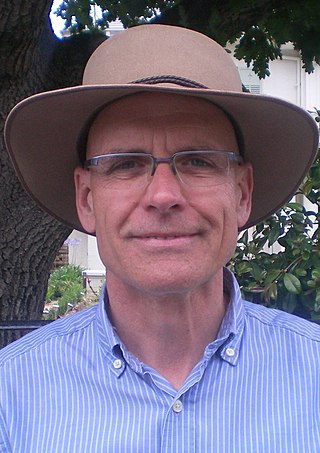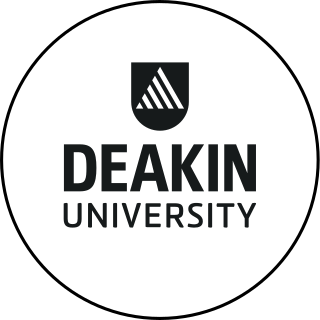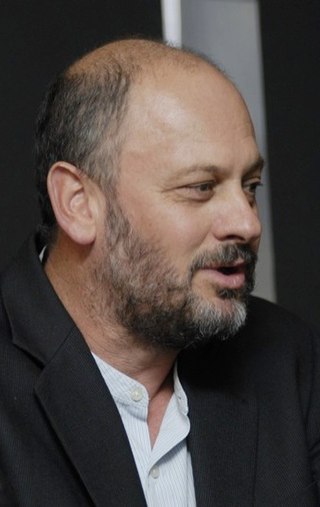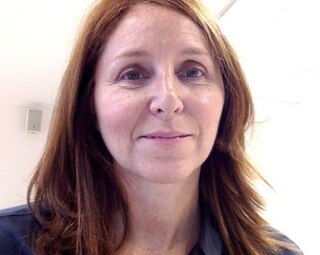Related Research Articles

The University of Technology Sydney (UTS) is a public research university located in Sydney, New South Wales, Australia. The university was founded in its current form in 1988, though its origins as a technical institution can be traced back to the 1870s. UTS is a founding member of the Australian Technology Network (ATN), and is a member of Universities Australia (UA) and the Worldwide Universities Network (WUN).

Clive Charles Hamilton AM FRSA is an Australian public intellectual currently serving as Professor of Public Ethics at the Centre for Applied Philosophy and Public Ethics (CAPPE) and the Vice-Chancellor's Chair in Public Ethics at Charles Sturt University. He is a member of the board of the Climate Change Authority of the Australian Government, and is the founder and former executive director of The Australia Institute. He regularly appears in the Australian media and contributes to public policy debates. Hamilton was granted the award of Member of the Order of Australia on 8 June 2009 for "service to public debate and policy development, particularly in the fields of climate change, sustainability and societal trends".

Deakin University is a public university in Victoria, Australia. Founded in 1974, the university was named after Alfred Deakin, the second Prime Minister of Australia.

Lucinda Mary Turnbull is an Australian businesswoman, philanthropist, and former local government politician. She served on the Sydney City Council from 1999 to 2004, including as Lord Mayor of Sydney from 2003 to 2004 – the first woman to hold the position. She has since held positions on a number of urban planning bodies, including as chief commissioner of the Greater Sydney Commission from 2015 to 2020. Her husband Malcolm Turnbull was prime minister of Australia from 2015 to 2018.

Glenn Marcus Murcutt is an Australian architect and winner of the 1992 Alvar Aalto Medal, the 2002 Pritzker Architecture Prize, the 2009 American Institute of Architects Gold Medal and the 2021 Praemium Imperiale. Glenn Murcutt works as a sole practitioner without staff, builds only within Australia and is known to be very selective with his projects. Being the only Australian winner of the prestigious Pritzker Prize, he is often referred to as Australia's most famous architect.

Timothy Fridtjof Flannery is an Australian mammalogist, palaeontologist, environmentalist, conservationist, explorer, author, science communicator, activist, and public scientist. He is especially known for his 1994 book The Future Eaters, on the natural history of Australasia, which was adapted for television in 2006, and his 2006 book The Weather Makers, about the effects of climate change in Australia.

Morris Iemma is a former Australian politician who was the 40th Premier of New South Wales. He served from 3 August 2005 to 5 September 2008. From Sydney, Iemma attended the University of Sydney and the University of Technology, Sydney. A member of the Labor Party, he was first elected to the Parliament of New South Wales at the 1991 state election, having previously worked as a trade union official. From 1999, Iemma was a minister in the third and fourth ministries led by Bob Carr. He replaced Carr as premier and Leader of the New South Wales Labor Party in 2005, following Carr's resignation. Iemma led Labor to victory at the 2007 state election, albeit with a slightly reduced majority. He resigned as premier in 2008, after losing the support of caucus, and left parliament shortly after, triggering a by-election. He was replaced as premier by Nathan Rees.

Arthur G.O. Mutambara is a multifaceted leader, academic, and technology expert currently serving as the director and full professor of the Institute for the Future of Knowledge (IFK) at the University of Johannesburg (UJ) in South Africa. Renowned for his expertise in robotics, academia, Pan-Africanism, and technology strategy, he is a pivotal figure in shaping the future of knowledge and technological advancement. At IFK, Mutambara leads the Decentralized Artificial Intelligence and Control Systems (DAICS) Research Group, driving groundbreaking research initiatives. He also spearheads the African Agency in Public Health (AAPH) initiative within the Future of Health (FoH) Research Group, demonstrating his commitment to leveraging technology for societal well-being. In addition to his academic responsibilities, Professor Mutambara is deeply involved in teaching Control Systems at both UJ's Mechanical Engineering and Electrical and Electronic Engineering Departments, imparting knowledge and fostering innovation among students.

Margaret Elaine Gardner is an Australian academic, economist and university executive serving as the 30th and current governor of Victoria since August 2023. She was previously the vice-chancellor of Monash University from 2014 to 2023 and the president and vice-chancellor of RMIT University from 2005 to 2014.

The Eureka Prizes are awarded annually by the Australian Museum, Sydney, to recognise individuals and organisations who have contributed to science and the understanding of science in Australia. They were founded in 1990 following a suggestion by science journalist Robyn Williams.
Padraic Pearse "Paddy" McGuinness was an Australian journalist, activist, and commentator. He began his career on the far left, then worked as a policy assistant to the more moderate Labor parliamentarian Bill Hayden. Later he found fame as a right-wing contrarian and finished his career as the editor of the conservative journal, Quadrant. He had also worked as a columnist for The Australian and The Sydney Morning Herald and as the editor of The Australian Financial Review.

Mark Diesendorf is an Australian academic and environmentalist, known for his work in sustainable development and renewable energy. He currently researches at the University of New South Wales, Australia. He was formerly professor of environmental science and founding director of the Institute for Sustainable Futures at the University of Technology, Sydney and before that a principal research scientist with CSIRO, where he was involved in early research on integrating wind power into electricity grids. His most recent books are The Path to a Sustainable Civilisation (2023) and Sustainable Energy Solutions for Climate Change (2014).
The Australia 2020 Summit was a convention, referred to in Australian media as a summit, which was held over 18–19 April 2008 at Parliament House in Canberra, Australia, aiming to "help shape a long-term strategy for the nation's future". Announced by the new prime minister Kevin Rudd, the summit drew limited bipartisan support from Brendan Nelson and the opposition Coalition parties and ran as 10 working groups of 100 participants. There were 1002 delegates in attendance to discuss ten "critical areas". Ideas and proposals were invited from all members of the community and an official website was set up to accept submissions.

Nuclear power in Australia has been a topic of debate since the 1930s. Australia has one nuclear reactor (OPAL) at Lucas Heights, New South Wales, which is only used to produce radionuclides for nuclear medicine, and does not produce electricity. Australia hosts 33% of the world's proven uranium deposits, and is currently the world's third largest producer of uranium after Kazakhstan and Canada.

Alan Anthony Dupont is an Australian international security expert, Defence and National Security Advocate for the Northern Territory and company director who has been the CEO of geopolitical risk consultancy the Cognoscenti Group since 2016. He is also contributing national security editor for The Australian newspaper, adjunct professor at the University of New South Wales (UNSW), a non-resident senior fellow at the Atlantic Council in Washington, and the Lowy Institute in Sydney and a fellow at the Hinrich Foundation.

Sohail Inayatullah is a Pakistani-born Australian academic, futures studies researcher and a professor at the Graduate Institute of Futures Studies at Tamkang University in Taipei, Taiwan.
Stephen Lincoln is a chemistry and physics professor at the University of Adelaide's Environment Institute. His work in molecular science has resulted in over 300 publications in scientific journals and he is the author of Challenged Earth: An Overview of Humanity’s Stewardship of Earth (2006), a book in which he discusses population, water, food, biotechnology, health, energy, climate change and the ozone layer. He has a long-term interest in nuclear power and is a board member and spokesperson for South Australian Nuclear Energy Systems, a private Australian company established in 2014 to explore the feasibility of nuclear industrial development projects in South Australia. Lincoln has been a media spokesperson on nuclear issues in the wake of the Fukushima nuclear disaster and in the lead up to South Australia's Nuclear Fuel Cycle Royal Commission in 2015. His work has been awarded by the Royal Australian Chemical Institute and UNESCO.

Francesca Rossi is an Italian computer scientist, currently working at the IBM Thomas J. Watson Research Center as an IBM Fellow and the IBM AI Ethics Global Leader.
References
- ↑ Professor Stuart White Archived 19 July 2008 at the Wayback Machine Institute for Sustainable Futures. University of Technology, Sydney.
- ↑ Professor Stuart White Archived 22 July 2008 at the Wayback Machine
- ↑ Professor Stuart White: Publications Institute for Sustainable Futures. University of Technology, Sydney.
- ↑ "The nuclear power option - expensive, ineffective and unnecessary". The Sydney Morning Herald. 13 June 2005.
- ↑ White, Stuart; Riedy, Chris (2 November 2006). "A climate protection act must have priority". The Sydney Morning Herald.
- ↑ "Expert pours cold water on desal". news.com.au. 12 November 2009.
